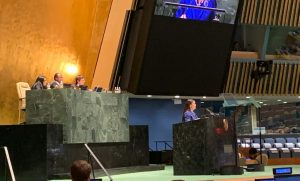Tapping our potential: Women’s water leadership in the Nile Basin
Cooperation over the shared water resources of the Nile Basin is essential to water security and development in the region. To mitigate and manage potential and actual drivers of water-related conflict in the region, improved and more inclusive resource decision-making is critical.

Engaging a diverse cross-section of stakeholders in decisions around shared waters broadens the set of environmental and social impacts that are considered and the knowledge and skills employed to address them, thus increasing the likelihood of developing sustainable and equitable solutions.
In the Nile Basin, SIWI and partners initiated a growing network of women water professionals active in transboundary water management under the ‘Women and Water Diplomacy in the Nile (WIN)’ platform to enhance the collective capacity of women throughout the basin and to support the engagement of these women water leaders in decision-making and peace building processes in the Basin.
The critical role of women in water resources management and protection has been recognized and emphasized at the highest policy levels for over 25 years. Yet, despite repeated high level commitments to engaging women in water governance, evidence reveals a persistent gender gap in the water sector. This gap is particularly evident at the transboundary level, where transboundary water governance processes continue to be dominated by men (Bazilli and Earle, 2013; IUCN, 2017).
Similarly, the transformative role of women in conflict prevention and peacebuilding has been repeatedly demonstrated, including research showing that gender inclusive peace processes are 35 per cent more likely to last at least 15 years, that peace agreements signed by women are positively associated with more durable peace, and that higher levels of gender equity are associated with a lower instance of conflict (Krause et. Al., 2018; UNSC, 2000).
Despite this evidence and the formal recognition of the UN Security Council of the critical role of women in peace and security efforts, between 1990 and 2017 women constituted only 2 percent of mediators, 8 percent of negotiators and 5 percent of witnesses in all major peace processes. Women in transboundary water governance therefore face a battle on two fronts in overcoming the traditionally male-dominated worlds of water and peacebuilding (UN Women, 2018).
Ensuring a better gender balance in water diplomacy efforts will require a sea change in perception of gender roles in both fields, accompanied by strong and implementable policies to overcome entrenched discrimination.
Summary
The critical role of women in water resources management and protection has been recognized and emphasized at the highest policy levels for over 25 years. Yet, despite repeated high level commitments to engaging women in water governance, evidence reveals a persistent gender gap in the water sector. This gap is particularly evident at the transboundary level, where transboundary water governance processes continue to be dominated by men (Bazilli and Earle, 2013; IUCN, 2017).
Similarly, the transformative role of women in conflict prevention and peacebuilding has been repeatedly demonstrated, including research showing that gender inclusive peace processes are 35 per cent more likely to last at least 15 years, that peace agreements signed by women are positively associated with more durable peace, and that higher levels of gender equity are associated with a lower instance of conflict (Krause et. Al., 2018; UNSC, 2000).
Despite this evidence and the formal recognition of the UN Security Council of the critical role of women in peace and security efforts, between 1990 and 2017 women constituted only 2 percent of mediators, 8 percent of negotiators and 5 percent of witnesses in all major peace processes. Women in transboundary water governance therefore face a battle on two fronts in overcoming the traditionally male-dominated worlds of water and peacebuilding (UN Women, 2018).
Ensuring a better gender balance in water diplomacy efforts will require a sea change in perception of gender roles in both fields, accompanied by strong and implementable policies to overcome entrenched discrimination.
Conclusions
The persistent failure to include women equitably in political decision-making processes at the transboundary level undermines progress towards cooperative and sustainable management and development of internationally shared river basins and aquifers, as well as between jurisdictions in the same country. Women have differentiated knowledge that is vital to sustainable resource management, as well as differing responsibilities, priorities, and needs around water use and management. For example, they are not only responsible for the burden of water collection in 8 out of 10 households (WHO and UNICEF, 2017), but also supply almost half of all irrigation labor in low and middle-income countries, thus playing a central role in managing and safeguarding water for both domestic and productive uses (FAO, 2017).
Enabling women to have a meaningful voice in decision-making therefore provides an opportunity to include their distinctive knowledge, diverse perspectives and experiences to facilitate a more comprehensive understanding of relevant water issues and challenges and to identify a broader set of equitable solutions to those challenges.
“I want to contribute to raise women’s awareness and have them involved in decision making about water issues. It is a national security issue to have the whole of society engaged in water decision making processes,” says a workshop participant.
Citation
The Women and Water Diplomacy in the Nile network and related activities are implemented under the Stockholm International Water Institute’s Shared Waters Partnership with the support of the Swedish International Development Agency (Sida). The Shared Waters Partnership (SWP) is a platform designed to improve cooperation over shared waters in regions where water is, or may become, a source of conflict or where water can serve as a catalyst for peace. The overall objective of SWP is peaceful cooperation between basin states sharing transboundary water resources.
This paper is authored by ELI’s Jessica Troell, Senior Attorney; Director, International Water Program; Director, Africa Program and SIWI’s Elizabeth A. Yaari, Senior Manager.
For more information on the Women in Water Diplomacy in the Nile network activities and knowledge products please contact Julienne Ndjiki, Program Officer, SIWI at julienne.ndjiki@siwi.org.



